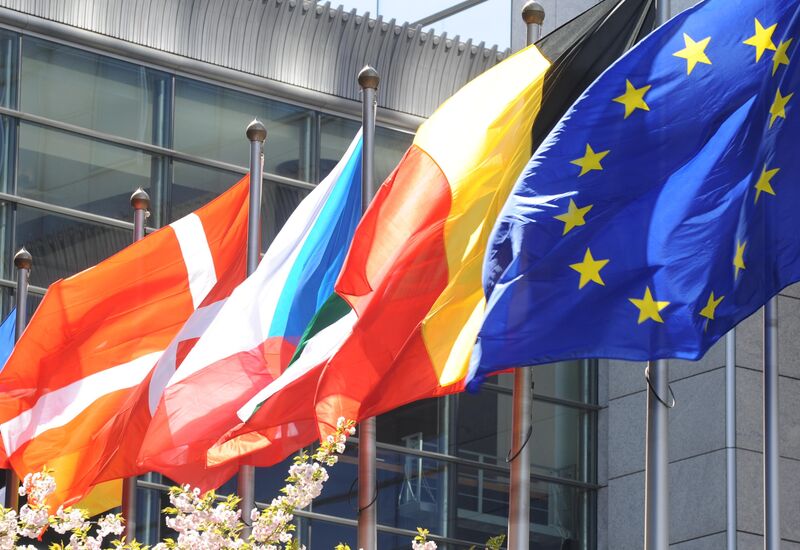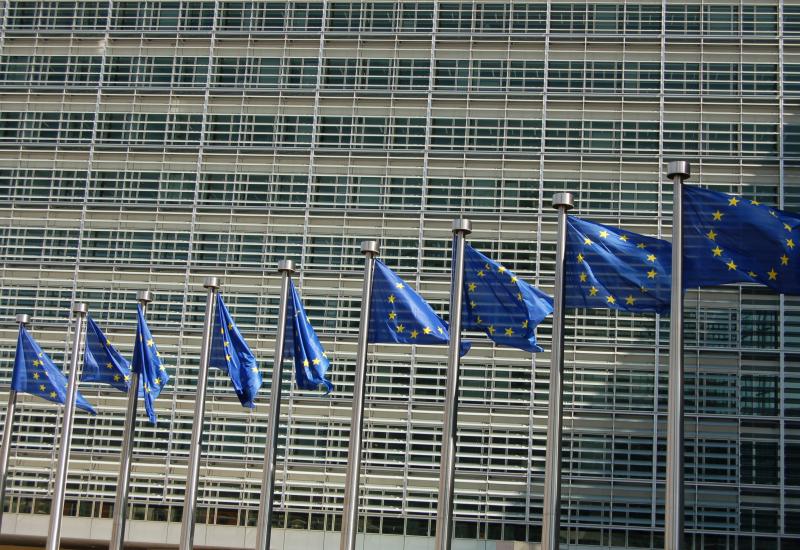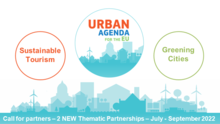European action
The Brussels-Capital Region defends Brussels’ interests at the European institutions and participates in many discussions and projects, particularly within the framework of the European networks of cities. perspective.brussels is one of the Brussels regional actors present on the European stage.
European Union and urban development
Perspective published an ABOUT, presenting how the European union Europe is supportings cities and how Brussels is taking advantage of this support in its territorial strategies for urban transition
European regional policy
European regional policy is the European Union’s main investment policy. It aims to reduce economic, social and territorial differences between regions and cities. It is comprised of four European funds:
- European Regional Development Fund (ERDF);
- European Social Fund (ESF);
- Cohesion Fund;
- Just Transition Fund
For the 2021-2027 period, the European Commission is planning to focus on five priorities: a smarter Europe (1), a greener, carbon free Europe (2), a more connected (3), more social Europe (4) and a Europe closer to citizens (5). This last priority will focus on projects relating to territorial planning and sustainable urban development.
perspective.brussels contributed to the preparation of the 2021-2027 cohesion policy. In partnership with Brussels international, it monitored and analysed the territorial dimension. This will allow the Brussels Region to conduct future projects at various territorial levels: inter-metropolitan (with the major cities of north-west Europe), metropolitan and inter-regional (with the other Belgian regions) regional (regional territorial plans such as the PRDD) and local (strategic areas and spatial planning tools).
The Leipzig Charter for sustainable European cities
Adopted in 2007, the Leipzig Charter defines the basic principles for the sustainable development of European cities:
- a sustainable;
- integrated;
- multi-level approach;
- priority given to renovating deprived neighbourhoods.
A new version of the Leipzig Charter: "The transformative power of cities for the common good" was adopted by European Ministers in 2020. It defines the three dimensions of the European city of tomorrow: a green, just and productive city. It also includes new notions such as citizen participation, co-creation and the common good. Finally, this new version covers different scales of intervention, from neighbourhood to the functional and metropolitan area.
perspective.brussels provides the official representation for the Brussels Region at the informal meetings of the Council which bring together experts and directors of the administrations responsible for urban development in the 28 Member States. The charter's revision is discussed at these meetings.
Urban Agenda for the European Union
The Urban Agenda for the European Union promotes cooperation between Member States, cities, the European Commission and other stakeholders in order to stimulate growth, durability and innovation in Europe's cities. It enables cities to be more involved in developing European policies and has set up partnerships on the 14 core themes for their future.
The Brussels-Capital Region is a member of two of these partnerships: Urban Poverty and Security in Public Spaces. In this second partnership, perspective.brussels works under the coordination of Brussels Prevention and Security.
The future of the Urban agenda is currently being discussed at within the Informal Council Meeting on Urban Development. The Urban agenda will support the operationalization of the New Leipzig Charter. Four new partnerships will be launched between 2022 and 2024: green cities, sustainable tourism, food and equality in the city.
The European Urban Initiative
The European urban initiative is a new instrument of the European Commission. It aims to provide coherent support to all urban areas. The Commission’s proposal is part of the current context of a highly-fragmented governance structure for different urban programmes.
Two main areas of activity will be supported:
- innovative actions;
- capacity building in terms of knowledge, public policies and communication.
Territorial Agenda of the European Union 2030
The Territorial Agenda 2030: sets out the territorial development priorities of the Member States by 2030. It replaces the Territorial Agenda 2020 adopted in 2011. It defines two overall objectives:
- a just Europe - offering future perspectives for all places and people;
- a green Europe - protecting common livelihoods and shaping societal transition.
It also proposes six common priorities for all European territories including circular economy and functional regions.
The Territorial Agenda 2030 will be implemented through pilot actions that meet the environmental and social challenges highlighted in the document.
perspective.brussels provides the official representation for the Brussels Region at the informal Council meetings which bring together experts and directors from the administrations responsible for territorial planning in the 28 Member States. The Territorial Agenda's revision is discussed at these meetings.
Actions of perspective.brussels
Official representation of the Brussels Region at the European institutions
At the European level, perspective.brussels represents the Brussels-Capital Region in three working groups: the Urban Development Group (UDG), the Network of Territorial Cohesion Contact Points (NTCCP) and the Expert Group on Territorial Cohesion and Urban Matters (EGTCUM).
Perspective also represents the Region on the Monitoring Committee and General Assembly of the ESPON (European Spatial Planning Observation Network) programme which supports the development of territorial policies in the European Union by producing and distributing research on territorial development.
Participation in European projects
In addition to the Regional ERDF and ESF programmes, there are several European programmes that can be used to obtain financing.
| Programmes | Brussels contact points | European information |
|---|---|---|
| URBACT | Belgian contact point |
URBACT Secretariat |
| Urban Innovative Actions | BRPS – Brussels International | Secretariat UIA |
| INTERREG North-West Europe | BRPS – Brussels International | Secretariat North-West INTERREG |
| INTERREG EUROPE | BRPS – Brussels international | Secretariat INTERREG |
| ESPON | Belgian contact point | GECT ESPON |
| HORIZON 2020 | Hub.brussels | European Commission |
| LIFE | Belgian Contact point | European Commission |
| ERASMUS+ | Wallonia-Brussels Federation Flanders |
ERASMUS+ |
perspective.brussels takes part in various European projects financed by these programmes.
Current projects
- Participation in the Cities4PED project financed by the JPI Urban Europe programme. This collaborative project between Vienna, Stockholm and Brussels concerns positive energy districts. The three partner cities study how cities can adapt their planning instruments to develop districts that produce more energy than they consume.
- Two projects financed by the ESPON programme
- STISE: a study on sustainable transport infrastructures in the strategic urban region Eurodelta. The results of the STISE research should enable the Brussels Region to develop more sustainable mobility with the cities of North-West Europe (Lille, Amsterdam, Rotterdam-The Hague, Cologne, Ruhr, etc.).
- METRO: a study on the role and future perspectives of cohesion policy in the planning of metropolitan areas and cities. This research should enable the Brussels Region to strengthen the links between its strategic and territorial planning policy and the European Union's cohesion policy.
Past projects
Cities of making, , a research project financed by the JPI Urban Europe and Horizon 2020 programmes, which explore the future of urban production in European cities; ;
Calico,an innovative Brussels intergenerational living project coordinated by Brussels Housing and the Community Land Trust Brussels (CLTB), and financed by the Innovative Urban Actions programme;
Watch our video on the Calico project
URBAN MAESTRO, a cooperation between UN-Habitat, the Bartlett School of Planning in London and perspective.brussels via the Bouwmeester master architect of the Brussels-Capital Region. It is funded by the Horizon 2020 programme and aims to improve urban quality through new, more flexible and creative planning methods;
Stop Drop-Out, a project bringing together partners from Belgium, France, Hungary and Aruba, financed by the Erasmus+ programme and which aims to discuss schemes to keep people attending school, targeting adults aged 30 to 34 years;
SPIMA, a project that studies the tools and approaches implemented by 10 European metropolitan areas (including the Brussels-Capital Region) to manage spatial development at metropolitan level. It is financed by the ESPON programme.
Follow up of European Directives in relation to spatial planning
perspective.brussels provides its expertise to the Belgian regional or federal administrations responsible for following up the negotiations on European Directives. Indeed, there are many European Directives that impact territorial planning policies such as the Strategic Environmental Assessment (SEA) Directive which sets new standards for taking environmental considerations into account in the planning process in several countries.
European networks and partners
Partnership with the European Metropolis of Lille
The European Metropolis of Lille is an important partner for the Brussels Region.
perspective.brussels helped to draft the new cooperation agreement between the two metropolitan areas, signed on 2 May 2019. This agreement focuses on three topics of common interest: attractiveness, sustainable land development and the European Union and international areas.
perspective.brussels coordinates the implementation of the priority on sustainable land development in which other Brussels organisations such as urban.brussels, Brussels Environment and Brussels Mobility are also involved. It also contributes to the European Union and international areas priority coordinated by Brussels International/Delegation of the BCR to the EU.
Exchanges with other European cities and regions
perspective.brussels contributes to the exchanges with other European cities and regions through workshops or field visits, in Brussels or abroad such as Prague, Malmö, Lille, Lyon, Oslo, Amsterdam, etc.
It is also active in conferences such as the Cities Forum, the European Week of Regions and Cities, the ESPON seminars, the annual conferences of the French Network of Urban Planning Agencies (FNAU), etc.
European bodies and networks
perspective.brussels is active in various bodies and networks in Europe:
Eurostat : monitoring the works as part of the participation of the BISA (Brussels Institute for Statistics and Analysis) at the Interfederal Statistical Institute (IIS)-, International positioning working group);
European Urban Audit: which measures the perception of quality of life in 79 European cities: the BISA provides data..
EUROCITIES, a platform for discussion and representation of major European cities in terms of urban issues; perspective.brussels presides over its Metropolitan areas working group and takes part in the activities of other working groups (Cohesion policy, EU Urban Agenda, Sustainable Development Goals, etc.) along with conferences and training courses;
METREX, a network of experts in territorial planning in European regions and metropolitan areas;
European Metropolitan Authorities (EMA), a network promoting and recognising the role of metropolitan areas in Europe; perspective.brussels participates in the annual EMA forum.
Documents
-
ABOUT.brusselsEurope'action in support of the transition of citiesHow does it translate to the Brussels Region?6perspective.brussels2021application/pdf (7.11 MB)
-
Ljubljana agreementapplication/pdf (426.51 KB)
-
New Leipzig Charter (2020) - ENapplication/pdf (2.24 MB)
-
Implementing the new leipzig charter (EN)application/pdf (2.8 MB)
-
Multiannual working programme for the Urban Agenda for the EUapplication/pdf (517.9 KB)






